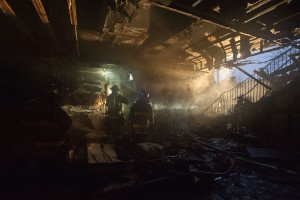You have no items in your cart. Want to get some nice things?
Go shopping
It’s the last night of a quiet four-day watch. Since what happened happened, all the shifts have been quiet.
The TV news is on in the break room and that’s quiet too. Volume high enough to pretend you’re paying attention, low enough to ignore. In another part of the fire station—in the kitchen or their bunks—are the new members of Green Watch. Them that have been brought in from other, smaller stations or fast-tracked through training. The three men here in the break room haven’t yet been able to learn any of the replacements’ names.
Playing draughts at the card table are Simon and Dan, grumpily keeping up a routine they’d established well before. Now as opposed to then, Dan and Simon no longer talk about having sex with each other’s wives as they play. They hardly talk at all. “King me,” they sometimes say. Both of them do still cheat. If one of them needs to leave the table for a minute, the other will sneak a piece or two off the board. They speak to Morgan even less now than when he first joined the service. Morgan sits heaped into a reclining chair that always used to be filled by another man.
Morgan remembers it like this: there were those who went in and those who stayed out, those who died and those who survived. Some who went in came out. The five from Green Watch didn’t. All who stayed out still lived. Simon and Dan both stayed out; both have kids and wives. Their families go on holidays together. Morgan used to say he didn’t want a family.
Morgan stayed out too. He knew that if he went in he would die. Running in alone as the swarming crowds ran out, he’d have been crushed or trampled under the weight of his own equipment. He saw the faces of the people coming out of the arena as they clambered over the turnstiles, their final obstacle. Their eyes bulged and their jaws gaped like they had made it from the depths of the ocean to the surface. They lay on their backs in the car park like marathon finishers, chests heaving, breathing and breathing the night air. Morgan helped the paramedics. He wrapped the people in blankets, even though they were sweating. The steam floating from their bodies changed colours with the flashing lights.
Them that stayed out had every right to; them that went in and came out never said they didn’t. Them that went in and came out never said much to them that stayed out. “A complete and utter death trap,” they sometimes said.
The news said that the ones who went in had gone beyond. They exceeded the level of sacrifice expected of them by astronomical proportions, went headlong with no consideration of the consequences. The news did not mention the ones who stayed out.
It wasn’t that there was a fire. Them that stayed out thought that there was. Morgan remembers some of the first people to reach the car park saying there was.
Remembers waiting to be told where to aim the pumps. Them that went in found out that there wasn’t—no need for all that cumbersome apparatus.
It was that they had sold too many tickets, allocated a thousand more than they were supposed to. Too many people got too excited when the band came to the stage. First they all wanted to get too close to the band, then they all wanted to get far away from them—to get out of there—too quickly. Human error, they said on the news. They mentioned lawsuits and compensation for the families of the victims.
Them that went in saw that the bodies became a high tide crashing against the edges and corners of the arena. Them that didn’t—Morgan—heard it described that way on the news. Other times it was called a stampede. Eventually all they had to do was say the name of the arena and you knew what they were talking about.
Morgan knew the arena well before its name became the name of an infamous tragedy. He had been a lifeguard at the leisure pool there when he was younger. The qualification looked good when he applied to join the Fire Service. In both jobs, they always told you that your number one priority was your own personal safety. When he was a lifeguard, Morgan didn’t think it was true. Not once did he have to jump in and save someone.
They are saying the name of the arena at the end of the news broadcast now. It’s almost a year since it happened and next week they’re going to be unveiling a statue to honour those who lost their lives.
The remote is right there with Morgan in the reclining chair, but in the end it’s Dan who gets up and walks across the break room to switch off the screen. While Dan is up, Morgan looks over at Simon. He wants to see Simon stealing one of Dan’s draughts pieces. Morgan thinks he needs that to happen and keep happening more than he needs anything else in the world.

About Joe Ransom
Joe Ransom is a writer from Sheffield, England. In 2014 he received his MFA from the University of San Francisco. His flash fiction story "Them That Didn't" was published by Litro in June. He lives in Boston, Massachusetts with his wife, Amanda.




